How to Get Rid of Ants in the Kitchen
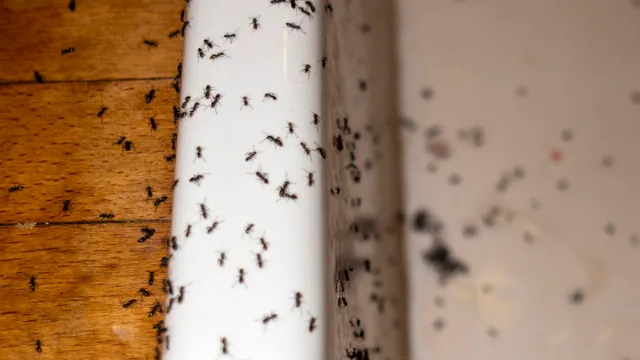
Seeing ants inside the house is never a good sign. When there’s one, there’s probably lots more hiding in the wings, just waiting for you to leave behind a spare crumb during your evening cleanup. However, you don’t need to share your space with pests. Read on to get pros’ best tips for how to get rid of ants in the kitchen. There are simple remedies you can use and strategies to avoid the problem in the future.
RELATED: 4 Soaps and Scents That Repel Mosquitoes, Experts Say.
Why Are There Ants in My Kitchen?
Ants are drawn to the same things humans are: “Food, water, and shelter,” says Nicole Carpenter, president of the pest-prevention service Black Pest. “It’s all about survival for them, and a kitchen is a place that offers all three things they need to thrive.”
The pros point out that the presence of ants doesn’t mean your space is “dirty” by any means. “Despite our perception of cleanliness, there are inevitably food and water sources that ants will discover and consume,” says Scot Hodges, ACE-certified entomologist and VP of professional development and technical services at Arrow Exterminators. “Upon finding a food source, they mark a trail with pheromones, communicating its location to other ants—this marked trail is what we commonly observe as a line of ants.”
RELATED: The Best Natural Insecticides to Help Save Your Garden.
14 Methods to Get Rid of House Ants for Good
1. Boric Acid
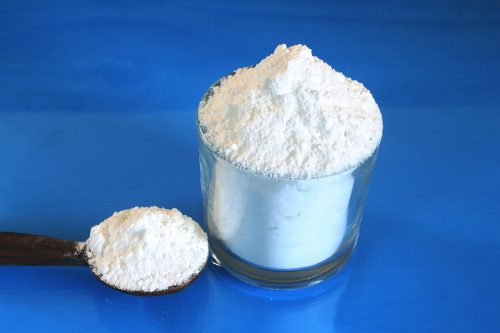
This is a tried and true measure for getting rid of certain types of worker ants—and one that professionals use all the time. Of the DIY hacks, it’s your best bet.
“Boric acid serves as a common active ingredient in many ant baits, and when consumed, ants pass it along, causing the demise of numerous colony members,” says Hodges. “Its slow-acting nature takes 48 to 72 hours to eliminate ants.”
However, you’ll need to apply it properly. If you use too heavy of a hand, the ants will simply avoid it, which will cause them to move elsewhere and not kill the ant colony.
“Boric acid’s effectiveness lies in its application into cracks, crevices, and void areas, in small, thin amounts,” says Hodges. “The end result should not be visible; otherwise, ants will likely steer clear.”
2. Essential Oils

Essential oils can’t kill ants, but they will deter them—plus, they’re safe for humans, pets, and the earth.
“Just add a few drops of essential oil with strong scents, such as peppermint, tea tree, or lemon eucalyptus oil, to a bottle of water, mix it, and then spray in all areas where ants have been seen, focusing on potential entry points such as cracks, holes, and gaps, particularly at ground level,” says Carpenter.
“I also love using citronella oil because, in addition to being effective at deterring ants, this oil is an excellent mosquito repellent, so you can kill two birds with one stone by using citronella oil,” she adds.
3. Distilled White Vinegar
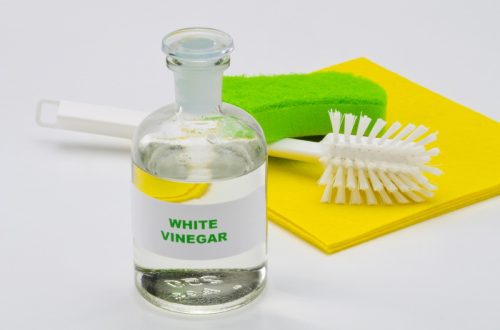
This method could kill some ants and deter others, but it won’t eliminate them completely.
“Ants found trailing inside a home are a small portion of the actual colony, usually located outdoors—and when ants are found trailing indoors, they find a food source and take that back to the colony,” says Kevin Hawthorne, board-certified entomologist with Terminix Service.
“You can use distilled white vinegar to wipe up ant trails indoors, such as on countertops, and it will kill the ants that are contacted and will help eliminate the pheromone trail they are using to locate the food source,” he adds.
However, the other ants in the colony may be able to find another route to that food source.
4. Baby Powder
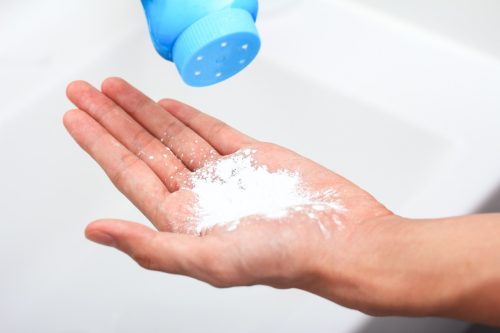
This product’s texture makes it a useful defense against pesky ants.
“Baby powder effectively absorbs moisture, causing ants to dehydrate and die,” says Carpenter. “Also, since many baby powders are talc-based and consist of fine particles, it can make it difficult for ants to traverse the powdered area, making it hard for them to move and reach food sources.”
Sprinkle it on entry points for best effects.
5. Diatomaceous Earth
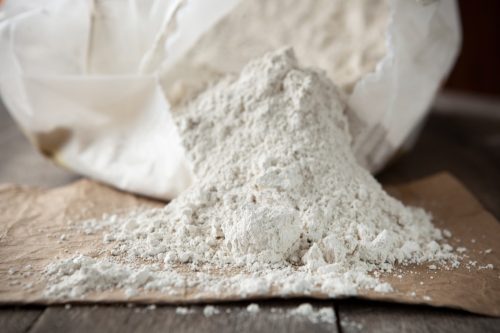
This powdery substance is made of fossilized algae and it’s an effective means for warding off ant colonies in the kitchen. Like baby powder, it dehydrates the ant.
Spread a thin layer on all points of entry and any cracks where you’ve seen ants. You should see relief within 24 to 48 hours, though you may have to repeat the process if the ants find an alternate route to their food source.
6. Coffee Grounds
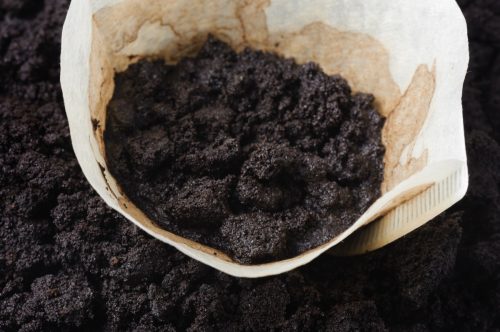
“There’s no particular property of coffee grounds that would deter ants better than any other products with a pungent smell—whether it’s vinegar, essential oil, or coffee grounds, they all work by masking the ants’ scent trails and making it harder for them to find food sources,” Carpenter explains. “Coffee grounds won’t kill ants but can make them want to leave your space and find another palace for living.”
Take your used coffee grounds and spread them around areas where ants enter your home. “This method is cheap, eco-friendly, and safe for humans and pets,” adds Carpenter.
7. Cayenne Pepper
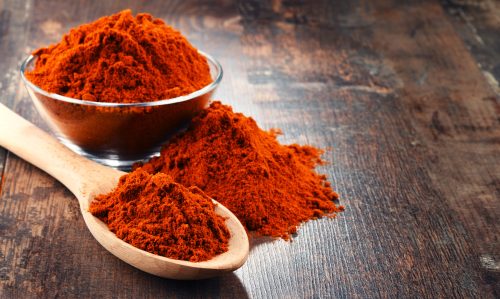
The strong scent of cayenne irritates ants, so they’ll attempt to avoid it. It also disrupts their pheromone trail. You can sprinkle it at entry points or mix it with water in a spray bottle and spray the trail and entry points.
8. Citrus Fruits

This is another way of throwing ants off their scent trail. Boil citrus peels in water, add the mixture to a spray bottle, and spray the entire colony and entry points.
9. Borax
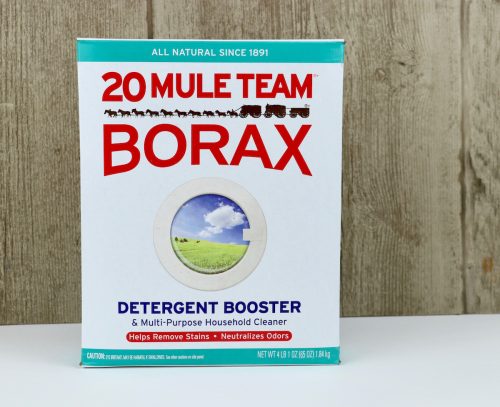
This is the same agent as boric acid. Carpenter has a creative way to use it to create bait.
“Mix borax with something sweet like sugar water or honey,” she explains. “The sugar lures the ants in, while the borax acts as a poison that they carry back to the colony, affecting other ants, including the queen.”
Just make sure it’s out of reach for kids and pets.
10. Liquid Detergent
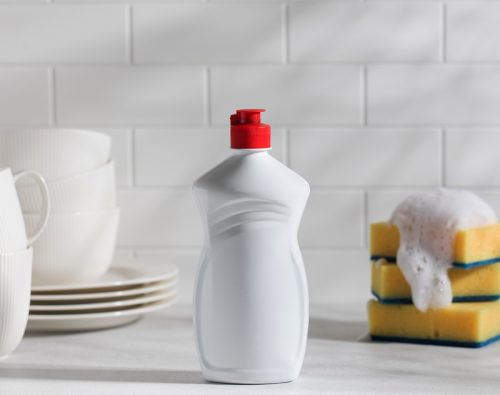
This hack is a common one to treat plants infested with pests. It kills ants but won’t keep them away for good. “The soap clogs up their spiracles (holes in the sides of their abdomen from which they breathe), causing them to asphyxiate,” explains Hawthorne.
“However, simply using soapy water to clean surfaces is not going to kill ants that crawl over that surface,” he notes. “Again, you can wipe up ant trails with soapy water and this will kill those particular ants, plus potentially eliminate their pheromone trail, but the colony will not be affected from losing a few individual ants.”
11. Peppermint

Like other essential oils, peppermint disrupts ants’ navigation. Carpenter suggests adding a few drops to a spray bottle with water and spritzing it on entry points.
12. Cinnamon
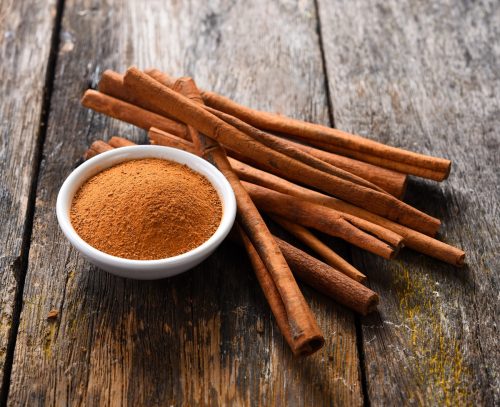
“Cinnamon has a strong smell that makes it difficult for ants to navigate and find food sources,” says Carpenter. “Homeowners can use it just like any other repellent, simply by placing them in areas where they have seen ants; if you have cracks and holes in windows, doors, or walls, strategically putting cinnamon in these areas might help prevent ants from entering your home.”
She adds that cinnamon powder is more effective as an ant deterrent than cinnamon sticks: “It is easier to spread throughout larger areas and hard-to-reach places where cinnamon sticks are hardly possible.”
13. Boiling Water
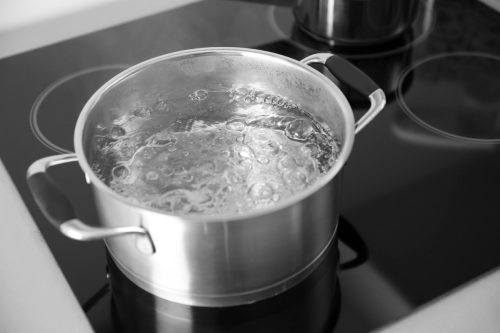
This method won’t help eliminate ants in the kitchen, but you can use it to destroy the ant nest outside if you can find it. Simply boil water and pour it onto the mound.
14. Salt
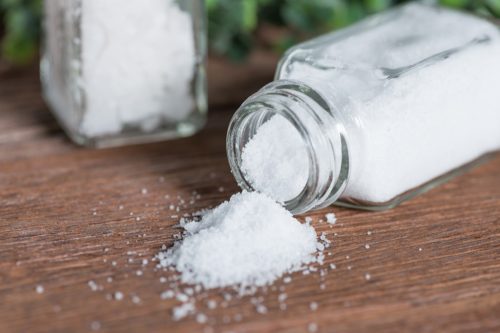
To make the boiling water even more effective, add a few tablespoons of salt to the mix, according to Trap Anything.
RELATED: 6 Bugs You Should Never Kill, Pest Experts Warn.
Additional Steps to Take
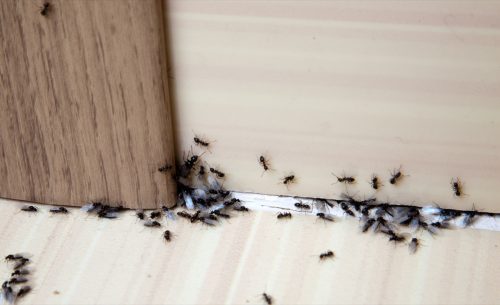
Seal Up All Entry Points
Carpenter says this one is crucial—if the ants can’t get into your home, then they can’t infest your kitchen.
Check Your Houseplant
If you notice the ants are flocking to your potted plant or fresh bouquets, you may need to bring those things outside. Peonies and roses tend to attract ants. They’re also known for hitching a ride of anything you bring in from the farmers’ market.
Keep The Kitchen Clean
“Ensure countertops, stovetops, and other surfaces are clean and free of food items; store foods in [airtight] containers; clean up spilled foods immediately, and ensure pet feeding areas are clean and free of spilled food,” says Hawthorne. “Finally, make sure the trash is taken out when needed, and the trashcan is clean and free of accumulated debris in the bottom.”
Don’t Leave Food Lying Around
This one’s big—if there’s food, ants will find it. If there’s nothing to sustain them, they’ll find a new spot. Remember: This includes pet food.
RELATED: How to Get Rid of Bed Bugs the Easiest Way Possible.
Types Of Ants To Look for
The type of pest in your kitchen says a lot about the ant infestation and if you’ll need professional help sooner rather than later.
“In many cases, you can collect specimens (the more, the better) and visit a local pest management company for identification,” says Hodges. “You can also go to a local county extension office, if available, as they can assist with identification.”
Hodges notes online resources may be helpful, but a magnifier could be necessary to ID some common ant species.
Sugar Ants
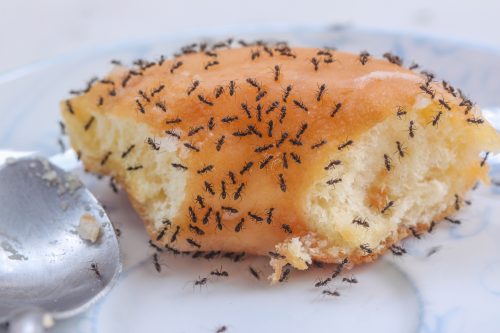
They nest outside and come indoors to find sweets.
Ghost Ants
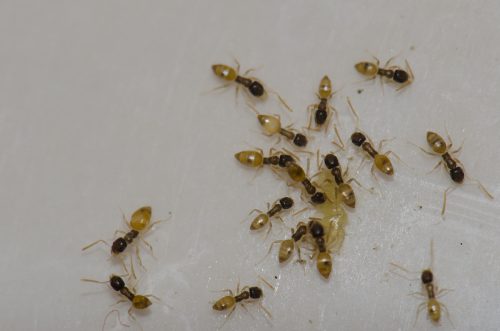
They’re super small in size and pale colored, which makes them difficult to spot.
White-Footed Ants
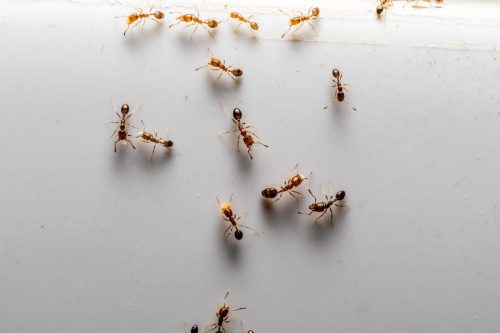
They’re typically after sweets and water and get their name from their white legs.
Big-Headed Ants
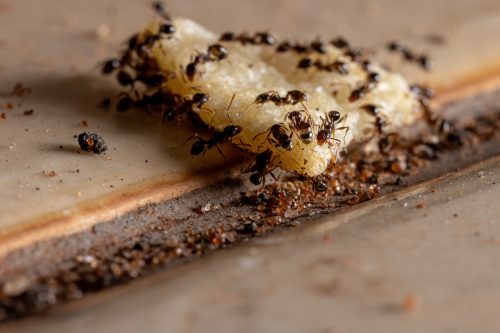
It’s an invasive species in the US.
Acrobat Ant
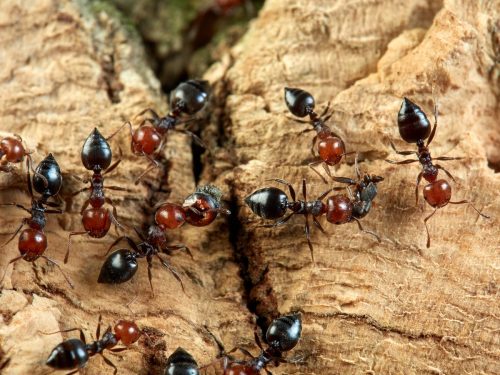
These ants nest in trees and rotten wood.
Odorous House Ants
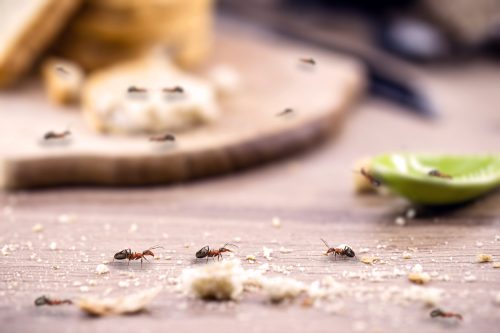
These guys get their name from the rotten smell they emit when crushed. They’re typically attracted to high-sugar foods, often feeding on aphid honeydew and nectar when outside.
Pavement Ants
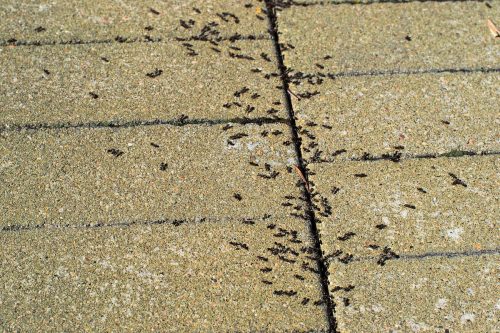
It’s one of the most common ants in the US and is often seen in the cracks of sidewalks, hence its name.
Carpenter Ants
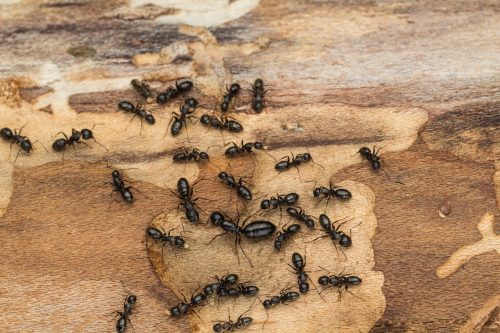
Beware if you see these. “They may indicate underlying structural issues such as water leaks or damage caused by moisture, which could be more significant than the mere presence of the ants,” says Hodges.
Fire Ants
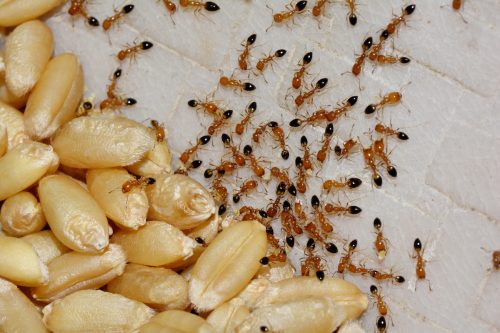
These require professional help. “In the case of fire ants and some other species of ants that sting and/or bite, it would be a good idea to contact a professional to prevent children, pets, and adults from being bitten or stung,” says Hodges.
RELATED: The No. 1 Thing Attracting Fruit Flies to Your Kitchen.
What If I Still Have Ants?
According to Hodges, deciding when to call a professional is up to you. “Each person has a different threshold for how many pests they can tolerate—for some it may be seeing just a couple of them, for others it may be hundreds or thousands,” he says. “Generally, if you are continually having issues with ants, it may be advisable to consult a professional.”
Conclusion
The way you go about how to get rid of ants in the kitchen depends on the level of infestation, the type of ant, and the supplies you have on hand. While products like boric acid and borax may work best, a number of things can help limit ants’ presence. For more home improvement tips, visit Best Life again soon.